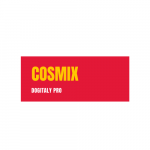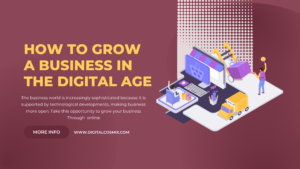Introduction to Digital Marketing
Digital marketing has emerged as the cornerstone of modern business promotion. It encompasses all marketing efforts that utilize electronic devices to connect with potential customers and measure the impact of promotional activities. From online videos and display ads to search engine marketing and social media campaigns, digital marketing offers a wide range of avenues to engage audiences and establish a robust brand presence.
In this comprehensive guide, we will explore the fundamental aspects of digital marketing, its importance in today’s business landscape, various types of digital marketing tactics, the benefits it offers, and how to create a successful digital marketing strategy. Whether you are a seasoned marketer or a business owner looking to enhance your online presence, this guide will equip you with the knowledge and strategies to succeed in the digital world.
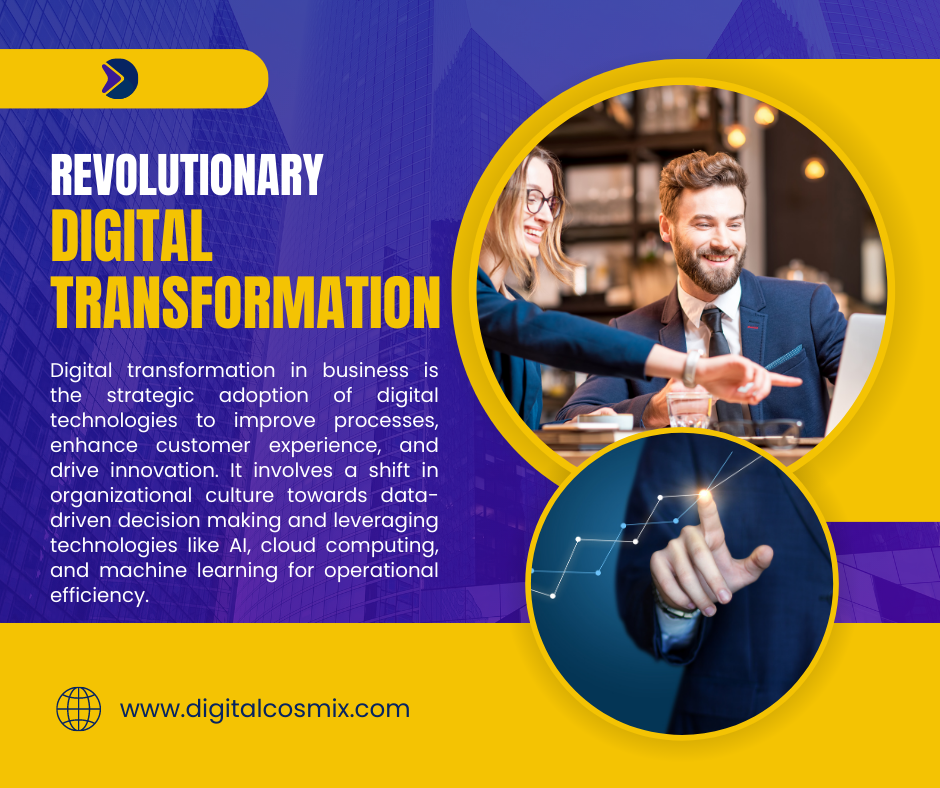
Why Digital Marketing Matters?
Widespread Internet Usage: In today’s digital age, the vast majority of people go online daily. With more than three-quarters of Americans accessing the internet regularly and 89% doing so via mobile devices, digital marketing provides an unparalleled opportunity to reach a global audience.
Cost-Effectiveness: Compared to traditional marketing channels, digital marketing offers cost-efficiency, enabling businesses of all sizes to implement effective campaigns without breaking the bank. This democratization of marketing levels the playing field for small businesses to compete with larger corporations.
Measurable Results: One of the key advantages of digital marketing is its ability to provide measurable and real-time results. Digital marketing platforms offer sophisticated analytics and reporting tools, allowing marketers to track the performance of campaigns and make data-driven decisions.
Precise Targeting: Digital marketing enables precise audience targeting based on demographics, interests, behavior, and other factors. This targeted approach ensures that marketing messages reach the most relevant and receptive audience, increasing the chances of conversion.
Enhanced Personalization: Data collected through digital channels enables marketers to deliver highly personalized content and offers, creating a more meaningful and engaging customer experience.
10 Types of Digital Marketing Tactics
- Search Engine Optimization (SEO)
Search engine optimization is the process of optimizing web pages to improve their visibility and ranking on search engine results pages (SERPs). By focusing on factors like content quality, user engagement, mobile-friendliness, and inbound links, businesses can enhance their online presence and attract organic traffic.
- Content Marketing
Content marketing involves creating and distributing valuable, relevant, and informative content to attract and engage target audiences. Content can take various forms, including blog posts, e-books, videos, infographics, and more. This approach establishes thought leadership, nurtures leads, and strengthens brand authority.
- Social Media Marketing
Social media marketing leverages popular social media platforms like Facebook, Twitter, Instagram, LinkedIn, and YouTube to engage with audiences, promote brands, products, and services, and foster customer relationships. With billions of active users, social media marketing offers unparalleled opportunities for businesses to connect with their target customers.
- Pay-Per-Click Marketing (PPC)
PPC is a form of paid advertising where businesses pay a fee every time a user clicks on their ads. This model, commonly used in search engine advertising (e.g., Google Ads), allows for precise targeting and immediate results. It is especially effective for driving traffic and generating leads.
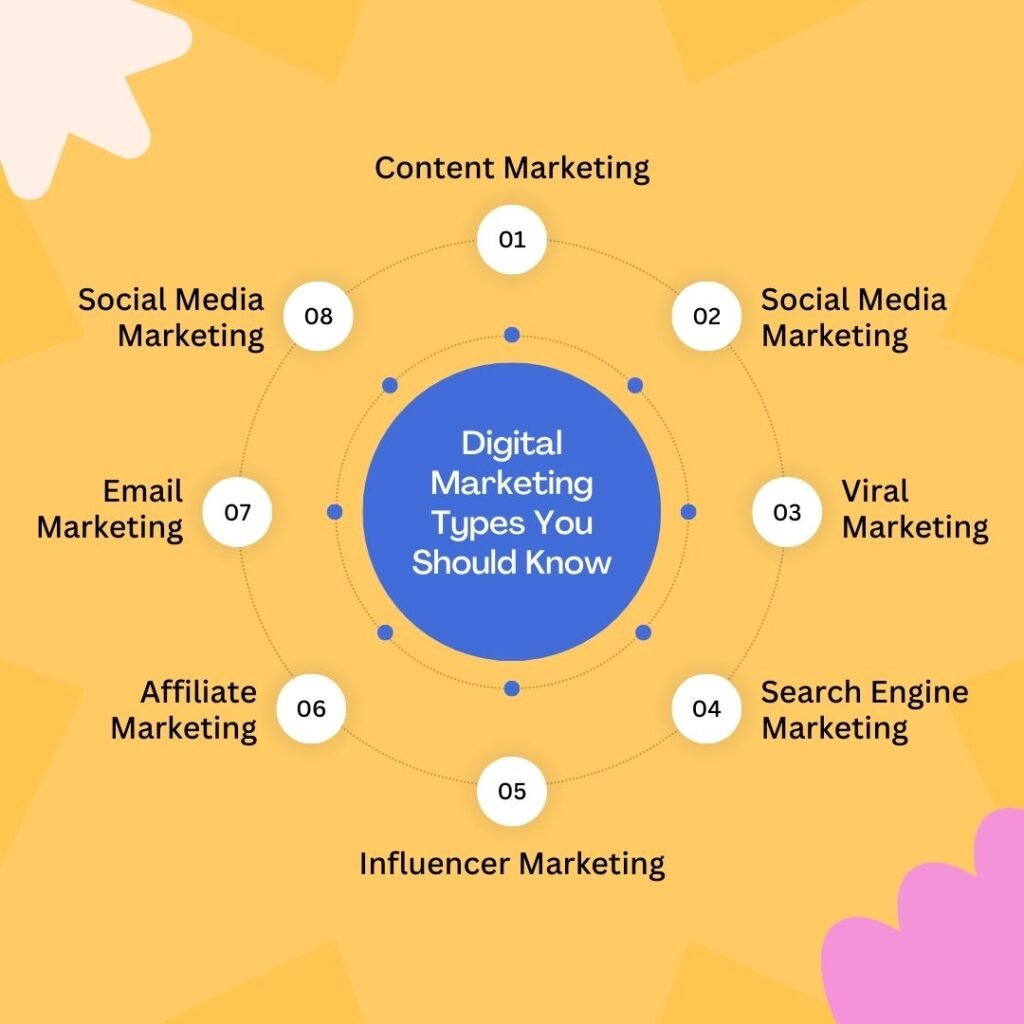
- Affiliate Marketing
Affiliate marketing is a performance-based marketing strategy where businesses partner with affiliates (individuals or other businesses) to promote their products or services. Affiliates earn a commission for each sale or conversion they drive through their unique referral links.
- Native Advertising
Native advertising blends seamlessly with surrounding content, making it less intrusive and more engaging for users. By providing value before presenting promotional content, native ads increase the likelihood of audience engagement and interaction.
- Influencer Marketing
Influencer marketing leverages the popularity and influence of individuals, such as celebrities, industry experts, or content creators, to promote products or services to their large following. This approach can significantly amplify brand awareness and credibility.
- Marketing Automation
Marketing automation uses software to automate repetitive marketing tasks and streamline campaigns. By nurturing leads with personalized and timely communications, marketing automation enhances customer engagement and conversion rates.
- Email Marketing
Email marketing involves sending targeted and personalized emails to subscribers with the aim of nurturing leads and fostering customer loyalty. Email campaigns can range from promotional offers and newsletters to automated drip campaigns.
- Mobile Marketing
Mobile marketing targets audiences on their mobile devices through SMS and MMS messages, app notifications, and mobile-optimized ads. Given the increasing use of mobile devices, this approach is essential for businesses to stay connected with their on-the-go customers.
Top 10 The Benefits of Digital Marketing
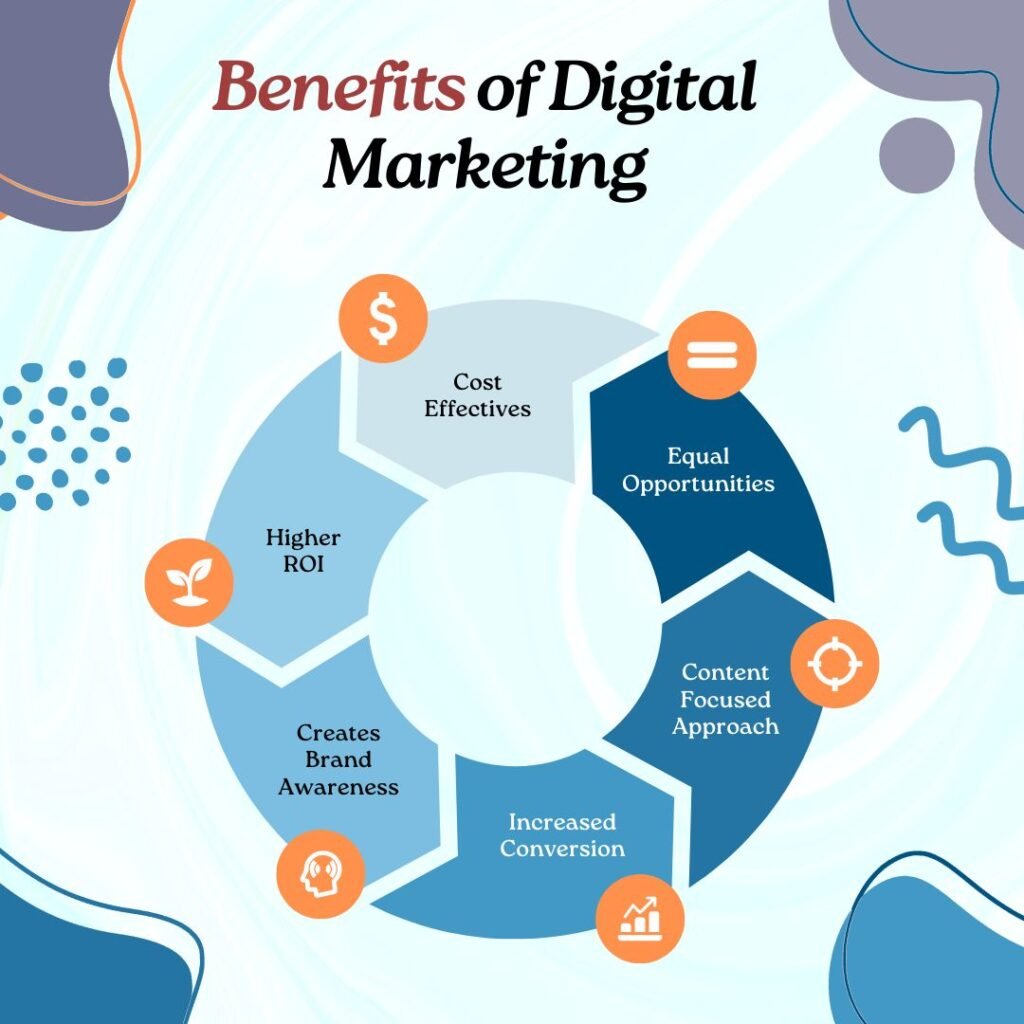
Broad Geographic Reach: Digital marketing allows businesses to connect with a global audience, breaking down geographical barriers and expanding market reach.
Cost Efficiency: Digital marketing offers a cost-effective alternative to traditional advertising channels, making it accessible to businesses of all sizes and budgets.
Measurable Results: Digital marketing provides precise data on campaign performance, enabling marketers to track key metrics and analyze ROI accurately.
Targeted Advertising: Digital marketing platforms allow for advanced targeting based on various criteria, ensuring marketing messages reach the most relevant audiences.
Personalization: Digital marketing enables personalized customer experiences, resulting in higher engagement and customer satisfaction.
Real-Time Engagement: Digital marketing facilitates real-time interaction with customers, creating immediate feedback loops and opportunities for direct engagement.
Enhanced Brand Loyalty: Through personalized content and engaging interactions, digital marketing fosters stronger customer relationships and brand loyalty.
Flexibility and Agility: Digital marketing allows businesses to adapt quickly to changing market conditions, consumer behavior, and industry trends.
Competing with Industry Giants: Digital marketing levels the playing field, enabling small businesses to compete effectively with larger corporations.
Global Visibility: With a strong digital marketing strategy, businesses can gain global visibility and attract international customers.
What are the Winning Digital Marketing Strategies?
A well-crafted digital marketing strategy is the foundation for successful online campaigns. Here are the essential steps to create a winning strategy:
Define SMART Goals: Set specific, measurable, achievable, relevant, and time-bound goals that align with your overall business objectives.
Know Your Audience: Conduct thorough market research to understand your target audience’s preferences, behaviors, and pain points. Use this information to tailor your messaging and content.
Allocate Budget Wisely: Determine your marketing budget based on your goals and the expected return on investment (ROI). Allocate resources strategically to the most effective channels.
Choose the Right Channels: Select digital marketing channels that align with your target audience and goals. Consider the unique strengths of each channel and how they can complement each other.
Create Compelling Content: Develop high-quality and relevant content that resonates with your audience. Engaging content builds brand credibility and fosters customer loyalty.
Optimize for Mobile: Ensure your website and digital content are mobile-friendly to accommodate the increasing number of mobile users.
Implement SEO Best Practices: Optimize your website and content for search engines to improve organic visibility and drive more traffic.
Embrace Social Media: Engage with your audience on social media platforms and use social listening to understand customer sentiment and preferences.
Leverage Data and Analytics: Use digital marketing analytics tools to track key performance indicators (KPIs) and gather actionable insights to refine your campaigns.
Test and Iterate: Continuously test different strategies and tactics, and use data-driven insights to make iterative improvements to your campaigns.
The Conclusion
In conclusion, digital marketing has revolutionized the way businesses connect with their audiences and promote their products or services. The wide-reaching capabilities of digital channels, combined with cost-effectiveness and measurable results, make it an indispensable tool for modern marketers. By leveraging various digital marketing tactics, businesses can establish a strong online presence, engage with their target customers, and drive meaningful interactions that foster brand loyalty.
The diversity of digital marketing strategies, from search engine optimization to social media marketing and influencer partnerships, offers businesses ample opportunities to tailor their approach to their specific goals and target audience. The key lies in crafting a well-defined digital marketing strategy that aligns with SMART goals and utilizes the strengths of different channels to complement each other.
Moreover, the ability to collect and analyze customer data through digital marketing provides invaluable insights into consumer behavior and preferences. By personalizing content and offers based on this data, businesses can enhance the customer experience and build lasting relationships with their audience.
As businesses continue to embrace digital marketing, they gain a competitive edge in the rapidly evolving online landscape. Small businesses can now compete with industry giants, and global visibility becomes attainable for even the smallest ventures. The digital realm offers an ever-expanding canvas for creativity and innovation, empowering marketers to engage audiences in more meaningful ways.
However, success in digital marketing requires constant adaptation and refinement. Continuous testing, monitoring, and analysis are essential for staying ahead of changing trends and consumer preferences. Businesses must remain agile and responsive to adjust their strategies according to the dynamic nature of the digital landscape.
In conclusion, digital marketing is not just a marketing tool but a fundamental aspect of modern business growth. Its transformative potential, coupled with its unparalleled reach and cost efficiency, makes it an indispensable tool for businesses looking to thrive in the digital age. By harnessing the power of digital marketing, businesses can unlock new opportunities for growth, engage with their audience on a deeper level, and stay ahead in an increasingly competitive market. Embracing the digital realm is not an option; it is a necessity for businesses that seek to flourish in the digital era.
